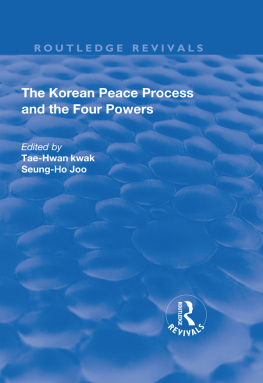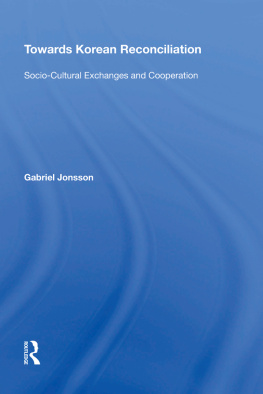Myung Ja Kim is currently a postdoctoral associate and has been a teaching fellow in Northeast Asian Politics at the School of Oriental and African Studies (SOAS), University of London. She completed her PhD at the Politics Department at SOAS where she received the Meiji Jingu Scholarship Award. Her MA in International Affairs was completed at the School of International Service, American University in Washington, DC. She has been a guest lecturer in Korean Studies at Tbingen University, and her work has been published in the Journal of Asian Security and International Affairs. She founded and was president of the NGO World Tonpo Network, Tokyo, an organization that seeks the peaceful unification of North and South Korea.
This is a wonderful book about the Zainichi Koreans a group that was identified neither as Japanese nor as foreigners. There is rich history in these pages but also useful arguments and lessons about how host nation-states treat diaspora groups.
Victor Cha,
D.S. Song-KF Professor of International Affairs and Government,
Georgetown University and author of Alignment Despite Antagonism: The USKoreaJapan Security Triangle
This book will ignite healthy and timely academic debate and advance our knowledge.
Seung-Young Kim,
Senior Lecturer,
School of East Asian Studies, University of Sheffield

Published in 2017 by
I.B.Tauris & Co. Ltd
London New York
www.ibtauris.com
Copyright 2017 Myung Ja Kim
The right of Myung Ja Kim to be identified as the author of this work has been asserted by the author in accordance with the Copyright, Designs and Patents Act 1988.
All rights reserved. Except for brief quotations in a review, this book, or any part thereof, may not be reproduced, stored in or introduced into a retrieval system, or transmitted, in any form or by any means, electronic, mechanical, photocopying, recording or otherwise, without the prior written permission of the publisher.
Every attempt has been made to gain permission for the use of the images in this book. Any omissions will be rectified in future editions.
References to websites were correct at the time of writing.
International Library of Twentieth Century History 94
ISBN: 978 1 78453 767 8
eISBN: 978 1 78672 185 3
ePDF: 978 1 78673 185 2
A full CIP record for this book is available from the British Library
A full CIP record is available from the Library of Congress
Library of Congress Catalog Card Number: available
Contents
List of Illustrations
Figures
Playing the diaspora card the role of interstate alliance in the treatment of diaspora groups
Causal pathways: alliance cohesion, interstate relations and policy toward the Zainichi
Population of ethnic Koreans in Japan, according to the census, 191045
Predicted policy-shifts toward the Zainichi during the Cold War era
Gaikokujin Tokei (statistics on foreigners in Japan)
North Korean missile ranges
Maps
The 38th parallel
Koreas geographical position in Asia
Acknowledgements
This book is, to a large extent, driven by my own search for identity something that has interested me for as long as I can remember, and which has led me to think deeply about who I am now and how that may shape my future. The ambiguous identity of post-colonial Koreans has held a fascination for me since my childhood days in Japan. In the course of my journey I have been privileged to study at SOAS, where I was influenced by passionate scholars such as my supervisor, Dr Fiona B. Adamson. Without her assistance, the completion of this book would not have been possible. I have learned about diaspora politics in particular detail from Dr Adamson; from the frequent interactions with her during my PhD course I hope, one day, to obtain answers to my own questions of identity which I can then use as a foundation for further academic inquiry. The ontological mechanisms discovered and discussed in this book (which are still open to further exploration) would be applicable to many other regions in the world, and my ambitions are to pursue an academic career in which I will be offered the chance to explore these possibilities to the best of my abilities.
I would like to acknowledge the support of the Meiji-Jingu Intercultural Research Institute in Tokyo. I was able to fully concentrate on my studies throughout my thesis thanks to the support of this institute via my scholarship.
I would also like to thank Dr Tat Yan Kong and Dr Harris Mylonas, whose advice and comments have greatly enriched my work.
Finally, I would like thank my family, especially my son, Yuki, who gives me the inspiration to continue this work. I would also like to thank my parents, who lived in a host country and raised their children with determination and incredible effort.
List of Abbreviations
| ABM | Anti-Ballistic Missile |
| ARO | Alien Registration Ordinance |
| CIS | Commonwealth of Independent States |
| DPRK | Democratic Peoples Republic of Korea (North Korea) |
| EEZ | Exclusive Economic Zone |
| FEC | Far East Commission |
| GDP | Gross Domestic Product |
| GHQ | General Headquarters |
| GNP | Gross National Product |
| GS | Government Section |
| GSDF | Japan Ground Self-Defence Force |
| HNS | Host Nation Support |
| ICRC | International Committee of the Red Cross |
| JCS | Joint Chiefs of Staff |
| JDA | Japanese Defence Agency |
| JSDF | Japan Self Defence Forces |
| JSP | Social Democratic Party of Japan |
| JUSMAG-K | US Military Assistance Group-Korea |
| KCIA | Korean Central Intelligence Agency |
| KDP | Korean Democratic Party |
| KEDO | Korea Energy Development Organization |
| KMAG | Korean Military Advisory Group |
| KPR | Korean Peoples Republic |
| LAZAK | Lawyers Association of Zainichi Koreans |
| LDP | Liberal Democratic Party |
| LWR | Light Water Reactor |
| NPT | Non-Proliferation Treaty |
| ODA | Official Development Assistance |
| OECD | Organisation for Economic Co-operation and Development |
| PRC | Peoples Republic of China |
| RCC | Resolution and Collection Corporation |
| ROC | Republic of China (Taiwan) |
| ROK | Republic of Korea (South Korea) |
| SALT | Strategic Arms Limitation Talks |
| SAR | Search-and-Rescue |
| SCAP | Supreme Commander of the Allied Powers |
| SDF | Self-Defence Force |
| SDI | Strategic Defence Initiative |
| UNCLOS | United Nations Convention on the Law of the Sea |
| UNTCOK | United Nations Temporary Commission on Korea |
| USMGK | US Military Government in Korea |
| USSR | Soviet Union |
| WMD | Weapons of Mass Destruction |
Introduction
The Puzzle: Contradictory Identities within the Zainichi Diaspora









